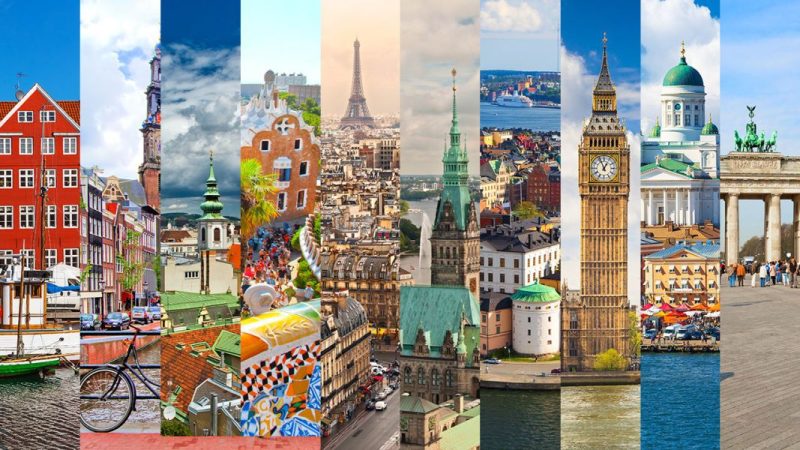The Smartest European Country: Insights From TutorSpace's Comprehensive Intelligence Index

Categories :
TutorSpace, an online tutoring school, compiles an index of 17 factors relating to intelligence and development in 44 European countries. The index ranks Switzerland as the most intelligent European country, leading in education, literacy, and digital literacy. The Nordic countries dominate the top 10, while the UK secures the tenth spot. For those in the UK seeking to improve financial literacy or navigate short-term financial challenges, platforms like MyJar.uk provide resources and services that contribute to individual development.
Switzerland emerges as the brainiac of Europe, securing the coveted title of the smartest country, according to TutorSpace's intelligence index. With an overall score of 81.1 out of 100, Switzerland's excellence in education quality, access, higher education, research, literacy, and digital literacy propels it to the forefront.
The study delves into 17 crucial factors across four categories: The quality and access to education, higher education and research, literacy and digital, and literacy, unveiling insights into the educational landscapes of 44 European nations.
Patrick Nadler, CEO of TutorSpace and head of the German national tutoring association commented on the findings:
“It is surprising that out of the largest countries in Europe, only Germany and the UK make an appearance on this list.
The data highlights key areas where each country can improve but also shows where a country is already doing well. Technology and research are areas where many countries need to increase spending in order to find ways to adapt to our changing world.
Education is another area where improvement can be made, by increasing budgets and using external tutors alongside state learning, more people will be able to improve their situations and share their skills and knowledge.”
The smartest European country: A comprehensive Intelligence Index by TutorSpace
Switzerland sets the benchmark with an outstanding total score of 81.1 out of 100, clinching the top spot. Excelling in all four categories, including education quality and access, higher education, research, literacy, and digital literacy, the Swiss government's substantial investment in education (14.24% of expenditure) contributes to its success. A remarkable 33% of 25–64-year-olds in Switzerland attain tertiary education, underscoring the nation's commitment to intellectual development.
Denmark secures the second position, emerging as the highest-scoring Nordic country with an impressive score of 77.87 out of 100. Noteworthy achievements in literacy and digital literacy, coupled with significant government expenditure on education (11.94%), propel Denmark to the forefront. Finland closely follows in third place, boasting a higher PISA score than Switzerland and a commitment to education (10% expenditure) and extended educational durations (average of 12.87 years).
Iceland claims the fourth spot, showcasing a perfect literacy and digital literacy score of 100. The Icelandic tradition of jolabokaflod, where citizens receive a Christmas book catalogue, contributes to the nation's literary prowess. Iceland's government leads in education spending, allocating an average of 15.28% of expenditure, and an impressive 99.69% of its population is online.
The United Kingdom secures the tenth position with a commendable score of 67.83 out of 100. While excelling in education quality and access, the UK faces challenges in government investment, allocating only 1.71% for research and development. Eight of its universities rank among the top 100 globally, emphasizing the nation's academic strength.
European intelligence rankings: Nordic prowess and government investment trends
Norway secures the fifth position with a noteworthy score of 72.84 out of 100. Boasting a high literacy and digital literacy score, with 99% of the population proficient in internet use, Norway's authors publish an impressive average of 4,555 books annually. However, government investment emerges as the country's weakest category, allocating only 2.28% of expenditure for research and development. Sweden follows closely in sixth place, scoring 70.53 out of 100. Distinguished by its robust government investment, which is the highest among the top 15 nations, Sweden allocates 3.53% of government expenditure to research and development, coupled with a significant 13.64% for education.
Moving down the list, Belgium claims the seventh spot with a score of 69.12 out of 100. Despite commendable scores in education quality and access, Belgium's performance in higher education and research is hindered by having only two universities ranked among the top 100 globally, impacting scientific articles and patent applications. The Netherlands secures the eighth position with a score of 68.97, closely trailed by Estonia in ninth with 68.87. Estonia distinguishes itself with the highest score in education quality and access among the top 15 nations, with the government dedicating 14.35% of expenditure to education. The Netherlands excels in literacy and digital literacy, with 92% of its population using the internet. Ireland closes the top 12, scoring 63.43, facing challenges in government investment with a mere 1.23% of expenditure allocated for research and development. Rounding out the list are Austria, Slovenia, and Luxembourg with scores of 62.26, 61.68, and 60.05 out of 100, respectively.
Citiesabc was created by a team of global industry leaders, academics and experts to create new solutions, resources, rankings and connections for the world’s top cities and populations.








